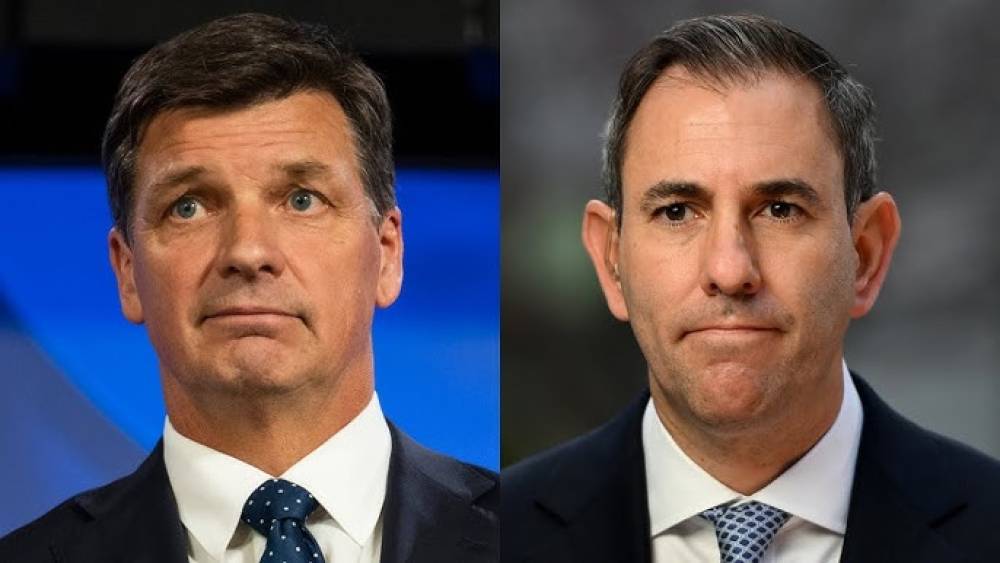
In a spirited and often personal showdown, Treasurer Jim Chalmers and Shadow Treasurer Angus Taylor faced off last night in the highly anticipated Sky News Treasurers’ Debate, clashing over the economy, living standards, and leadership character as Australians prepare to head to the polls on May 3.
Chalmers' 'Glass Jaw' and Taylor’s ‘Work Ethic’ Questioned
Moderated by veteran broadcaster Ross Greenwood, the debate took a strikingly personal tone early on, with both candidates grilled not only on economic policy but also on their personal reputations.
Chalmers, described by colleagues as the “best communicator” in Labor, was confronted with claims of having a “glass jaw” when it comes to criticism. He acknowledged getting “a bit grumpy sometimes” but said he had matured in handling public and political feedback.
Taylor, meanwhile, was challenged on whether he lacked the work ethic needed to match his intellect and credentials. Dismissing the claims, Taylor responded that he works “every single day for hardworking Australians,” highlighting his 25-year background in business and economics before politics.
Economy, Cuts and the Cost of Living Dominate the Agenda
As expected, cost-of-living pressures and economic management dominated the debate. Taylor accused Labor of overseeing “the biggest collapse in living standards in history,” claiming households are now $1300 worse off than what was promised.
“Prices are up, debt is up, and standard of living is down,” Taylor said. “Australians can’t afford another three years like the last three.”
Chalmers defended Labor’s track record, saying inflation is now down to 2.4%, and Australia’s economy is more resilient than global counterparts.
“We’ve delivered tax cuts, cheaper energy bills, and strengthened Medicare,” Chalmers said. “We’re building Australia’s future – the alternative is secret cuts and chaos.”
A Clash Over Credibility and Nuclear Costs
Chalmers repeatedly challenged Taylor to “come clean” on where the Coalition would make spending cuts to fund its proposed $600 billion nuclear energy plan. Taylor avoided direct answers but promised not to touch essential services like Medicare or pensions.
In a fiery exchange, Chalmers accused Taylor of fabricating statistics on energy and insurance price rises. “You’ve just made those numbers up,” Chalmers said, sparking one of the night’s most heated moments.
The $275 Apology That Never Came
Greenwood pressed Chalmers on Labor’s failed 2022 election promise to reduce energy bills by $275. While Chalmers didn’t explicitly apologise, he said he took responsibility and pointed to energy rebates that lowered bills by $300 last year.
Taylor seized the moment, calling it a broken promise that defined Labor’s economic mismanagement.
Jobs, Deficits, and Recession Talk
Chalmers highlighted Labor’s record-low unemployment rates and two successive surpluses. But Taylor countered that GDP per capita has fallen for 21 straight months, labelling Labor’s term a “lost decade.”
With fears rising over potential recession following Donald Trump’s new global tariffs, Chalmers dismissed Opposition Leader Peter Dutton’s warnings, calling them “lies.” He maintained that growth would continue under Labor’s stewardship.
Closing Arguments: Vision vs. Reality
In closing, Chalmers framed the election as a choice between “resilience or regression,” touting Labor’s plans for tax cuts, housing, and stronger Medicare.
Taylor struck a sharp contrast, promising “immediate relief,” including a 25-cent per litre fuel excise cut and reduced energy bills through increased gas supply.
“The key question for this election is: Who do you trust to manage the economy?” Taylor said.
Verdict: A Divided Debate, Clear Stakes
With tempers flaring and visions clashing, the debate laid bare the stark choice facing voters in May. While Chalmers leaned on stability and gradual recovery, Taylor played to rising frustrations over household pressures and promised a dramatic course correction.
As the election clock ticks, one thing is clear – the economy remains the battleground, and both sides are betting big on who can claim the trust of struggling Australians.